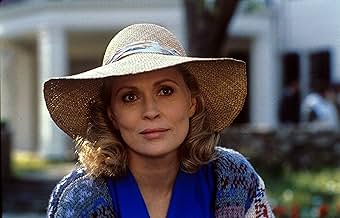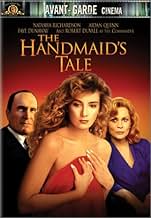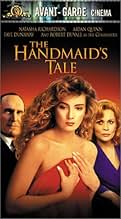Under a dystopian religious tyranny, most women cannot conceive children. Those young women who can live in a form of sexual slavery to provide children for influential families.Under a dystopian religious tyranny, most women cannot conceive children. Those young women who can live in a form of sexual slavery to provide children for influential families.Under a dystopian religious tyranny, most women cannot conceive children. Those young women who can live in a form of sexual slavery to provide children for influential families.
- Director
- Writers
- Stars
- Awards
- 2 wins & 1 nomination total
Reiner Schöne
- Luke
- (as Rainer Schoene)
Robert D. Raiford
- Dick
- (as Robert Raiford)
- Director
- Writers
- All cast & crew
- Production, box office & more at IMDbPro
Featured reviews
I'm surprised by some of the negative comments on this film. In my opinion, it represents the best kind of literary adaptation that the cinema offers: One in which the screenwriter and director clearly remained faithful to the spirit of the book without attempting to reproduce it. How can you go wrong with a Margaret Atwood book, a Harold Pinter screenplay and Volker Schlöndorff's direction? Some have suggested that the film suffered from "wooden" acting. Personally, I thought it was a fantastic cast: Robert Duvall and Victoria Tennant at their evil best; Faye Dunnaway as the "defeated" wife; Elizabeth McGovern as saucy as ever; Aidan Quinn and Natascha Richardson in the necessarily bland roles that drive the narrative. What holes here?
Commercial film doesn't get any better. "The Handmaid's Tale" is a dark portrait of a world unlike ours and yet so much like ours... in which a right-wing, bureaucratic patriarchy dominates the land. Women have three main functions (for which their clothing is color coded): Red for the handmaids, who are walking wombs; white for the innnocent children; blue for the sterile trophy wives. Brown is worn by the "aunts", a futuristic equivalent of the Sonderkomando (i.e., Jews who worked on behalf of the Nazi's in the death camps), evil schoolmistress types who both train/brainwash young women for assignment and occasionally destroy them. A fifth function, for which the garb is particularly interesting, is "working" in Gilead's underground social club (essentially a den of iniquity, rife with prostitution and drugs.) Point is... by splitting up these functions, hasn't Atwood described the basic roles that women play within our own male-dominated society, in various different permutations and combinations? To the patriarchy, women are mothers, models, sluts, angels and, when professionals, they are not to aspire to more teaching posts. In Gilead, the lines are clearer; in our own society, aren't most women "supposed to" play some combination of all of these roles?
I get the feeling that most moviegoers are looking for something else in "sci-fi." Here's a new plot twist: The rebels feed Kate some kind of medication that allows her to read the commander's mind while destroying his brain. Wait... that's "Scanners." Oops. Seriously, two of the reviews on this site made spedific mention of Schlöndorff's "horrible", "atrocious" directorial skills. Ahem. Perhaps before they weigh in on the auteur, they ought to see "Young Törless", "Coup de grâce", "The Tin Drum" and all of his other wonderful efforts. As a matter of fact, to insinuate that someone who could bring Grass' Tin Drum to the screen in such a stunning fashion is a lousy director is PREPOSTEROUS. Schlöndorff is a giant of the New German Cinema, and it underscores the ignorance of the Hollywooders when they cast such baseless aspersions.
Commercial film doesn't get any better. "The Handmaid's Tale" is a dark portrait of a world unlike ours and yet so much like ours... in which a right-wing, bureaucratic patriarchy dominates the land. Women have three main functions (for which their clothing is color coded): Red for the handmaids, who are walking wombs; white for the innnocent children; blue for the sterile trophy wives. Brown is worn by the "aunts", a futuristic equivalent of the Sonderkomando (i.e., Jews who worked on behalf of the Nazi's in the death camps), evil schoolmistress types who both train/brainwash young women for assignment and occasionally destroy them. A fifth function, for which the garb is particularly interesting, is "working" in Gilead's underground social club (essentially a den of iniquity, rife with prostitution and drugs.) Point is... by splitting up these functions, hasn't Atwood described the basic roles that women play within our own male-dominated society, in various different permutations and combinations? To the patriarchy, women are mothers, models, sluts, angels and, when professionals, they are not to aspire to more teaching posts. In Gilead, the lines are clearer; in our own society, aren't most women "supposed to" play some combination of all of these roles?
I get the feeling that most moviegoers are looking for something else in "sci-fi." Here's a new plot twist: The rebels feed Kate some kind of medication that allows her to read the commander's mind while destroying his brain. Wait... that's "Scanners." Oops. Seriously, two of the reviews on this site made spedific mention of Schlöndorff's "horrible", "atrocious" directorial skills. Ahem. Perhaps before they weigh in on the auteur, they ought to see "Young Törless", "Coup de grâce", "The Tin Drum" and all of his other wonderful efforts. As a matter of fact, to insinuate that someone who could bring Grass' Tin Drum to the screen in such a stunning fashion is a lousy director is PREPOSTEROUS. Schlöndorff is a giant of the New German Cinema, and it underscores the ignorance of the Hollywooders when they cast such baseless aspersions.
I finally watched this after watching the TV show and if anything, it shows that some books should not be adapted unless there is enough time to tell the story.
The film tries to feature the key moments that the TV show had time to bring up, and 90 minutes (or so) simply isn't enough.
The casting is flawed on several characters, like many reviewers point at, and the script feels rushed, which of course creates the feeling that the story progresses without any logic.
Nonetheless you will find some scenes are really good, and in fact, those same scenes found their way into the TV show.
The atmosphere of the book is well conveyed, I just wish they had had more time, which the largely superior TV show had.
Watch this for reference after reading the book, after watching the show : great books can make awesome TV shows but poor films sometimes.
The film tries to feature the key moments that the TV show had time to bring up, and 90 minutes (or so) simply isn't enough.
The casting is flawed on several characters, like many reviewers point at, and the script feels rushed, which of course creates the feeling that the story progresses without any logic.
Nonetheless you will find some scenes are really good, and in fact, those same scenes found their way into the TV show.
The atmosphere of the book is well conveyed, I just wish they had had more time, which the largely superior TV show had.
Watch this for reference after reading the book, after watching the show : great books can make awesome TV shows but poor films sometimes.
This is a nightmare vision of the future. It seems 1 out of every 100 women is fertile (for some reason). The ones who aren't perform slave labor. The ones that are are "sold" off to rich families where they have sex with the husband to produce a baby. Kate (the late and missed Natasha Richardson) is one such servant to Serena Joy (Faye Dunaway) and her husband the Commander (Robert Duvall). Kate wants out--but it seems there's no way.
The synopsis only scratches the surface of a VERY dark and disturbing movie. It slowly shows how women are treated and used and it just gets more horrifying as it unfolds. The parallels to Hitler's Nazi Germany are fairly obvious but here we have barren women instead of Jews and gays. The good acting by everybody makes this hard to shake off. Aidan Quinn (as Nick) and Duvall are OK; Victoria Tennant is chilling as a leader of the camps; Elizabeth McGovern is just great as a fellow prisoner who befriends Kate; Dunaway is also very good in her role. Best of all is Richardson. This couldn't have been an easy role but she pulls it off beautifully. She died at far too young an age. This is basically an unknown movie and it's easy to see why--it's far too dark and disturbing for a general audience. However the ending is (sort of) uplifting (and changed from the book). Grim, dark and depressing. View it at your own risk. The ceremony sequences are almost impossible to watch and shocked the hell out of me the first time I saw this.
The synopsis only scratches the surface of a VERY dark and disturbing movie. It slowly shows how women are treated and used and it just gets more horrifying as it unfolds. The parallels to Hitler's Nazi Germany are fairly obvious but here we have barren women instead of Jews and gays. The good acting by everybody makes this hard to shake off. Aidan Quinn (as Nick) and Duvall are OK; Victoria Tennant is chilling as a leader of the camps; Elizabeth McGovern is just great as a fellow prisoner who befriends Kate; Dunaway is also very good in her role. Best of all is Richardson. This couldn't have been an easy role but she pulls it off beautifully. She died at far too young an age. This is basically an unknown movie and it's easy to see why--it's far too dark and disturbing for a general audience. However the ending is (sort of) uplifting (and changed from the book). Grim, dark and depressing. View it at your own risk. The ceremony sequences are almost impossible to watch and shocked the hell out of me the first time I saw this.
An unfortunate movie which is definitely more like Harold Pinter's earlier plays than anything Margaret Atwood ever produced. No attempt is made to bring out Atwood's clever social message, and we're all supposed to be shocked at the sexual content. A shame, because Atwood's version might have made a good film.
Margaret Atwood, a Canadian novelist (and poet) wrote the dark fantasy novel on which this film is based. It is set in The Republic of Gilead, formerly the United States, or at least the parts of it that are not radioactive. The radioactive parts are called the colonies, where bad girls are sent to die of radiation poisoning. The time is the near future, after the inevitable nuclear war, and the breakdown of government as we know it.
The society depicted in The Handmaid's Tale is a nightmare: everyone is watched by the Eyes, unknowable, unseen government spies. Women are forbidden to have jobs. They are irrevocably assigned to classes. At the top are the chaste, but morally superior, Wives, almost all of whom have been rendered infertile by the inevitable unclear war. At the bottom are the housekeepers, or Marthas, who are non-entities. In the middle are the Handmaids of the title, who are fertile, but tightly controlled. The term Handmaid is a Biblical term that is used in the Old Testament stories of Abraham, Sarah, Jacob and Rachel. In the Bible, the wives gave their handmaids to their husbands in order to produce heirs.
Handmaids, in the film and the book, are forced to have sex with the Commanders, the husbands of the Wives. During this sex, the Wives are intimately present to take in any "love" their Commanders have to give.
The Handmaids are trained to remain unattached to the Commanders. They are prohibited from using makeup or doing anything to make themselves attractive. Handmaids are forced to turn their offspring over to the morally "fit" Wives.
Robert Duvall, a Commander in whose home Offred is placed, gives a family Bible reading performance that will curdle the blood of true people of faith. It is a breathtaking, heart-stopping performance.
The government is totalitarian and monotheistic. The one god is very strict, and has His Eyes everywhere.
Offred, who was once known as Kate, is a Handmaid who, despite her training (read brainwashing), recalls her past, her loving husband, and her adored daughter. She tells with sparkling, and terrifying clarity, how the society came to be the way it is.
This governmental aspect of the story is instructive, however, they are almost totally absent in the film.
Offred's/Kate's personal story is heartrending. It reminds one of the miseries of, say, the women of Darfur. When the government breaks down, she and her husband and daughter attempt to flee to Canada. Unfortunately, they are caught. Her daughter is "confiscated." Her husband is taken away. She never sees her husband again.
Offred's training is not as extensively portrayed in the film as it is in the book, but her feeling of terror and helplessness are palpable, in an exquisite performance by Natasha Richardson. Warning, blood is shown.
As we ride down the slippery slope toward the overturning of Roe v. Wade, this film is a must see for those who still care about women's rights.
The society depicted in The Handmaid's Tale is a nightmare: everyone is watched by the Eyes, unknowable, unseen government spies. Women are forbidden to have jobs. They are irrevocably assigned to classes. At the top are the chaste, but morally superior, Wives, almost all of whom have been rendered infertile by the inevitable unclear war. At the bottom are the housekeepers, or Marthas, who are non-entities. In the middle are the Handmaids of the title, who are fertile, but tightly controlled. The term Handmaid is a Biblical term that is used in the Old Testament stories of Abraham, Sarah, Jacob and Rachel. In the Bible, the wives gave their handmaids to their husbands in order to produce heirs.
Handmaids, in the film and the book, are forced to have sex with the Commanders, the husbands of the Wives. During this sex, the Wives are intimately present to take in any "love" their Commanders have to give.
The Handmaids are trained to remain unattached to the Commanders. They are prohibited from using makeup or doing anything to make themselves attractive. Handmaids are forced to turn their offspring over to the morally "fit" Wives.
Robert Duvall, a Commander in whose home Offred is placed, gives a family Bible reading performance that will curdle the blood of true people of faith. It is a breathtaking, heart-stopping performance.
The government is totalitarian and monotheistic. The one god is very strict, and has His Eyes everywhere.
Offred, who was once known as Kate, is a Handmaid who, despite her training (read brainwashing), recalls her past, her loving husband, and her adored daughter. She tells with sparkling, and terrifying clarity, how the society came to be the way it is.
This governmental aspect of the story is instructive, however, they are almost totally absent in the film.
Offred's/Kate's personal story is heartrending. It reminds one of the miseries of, say, the women of Darfur. When the government breaks down, she and her husband and daughter attempt to flee to Canada. Unfortunately, they are caught. Her daughter is "confiscated." Her husband is taken away. She never sees her husband again.
Offred's training is not as extensively portrayed in the film as it is in the book, but her feeling of terror and helplessness are palpable, in an exquisite performance by Natasha Richardson. Warning, blood is shown.
As we ride down the slippery slope toward the overturning of Roe v. Wade, this film is a must see for those who still care about women's rights.
Did you know
- TriviaWhile working on the film, Robert Duvall became so fascinated with evangelism that it inspired him to write Le prédicateur (1997).
- GoofsWhen Moira ties up Aunt Lydia and escapes the Red Center, it is late at night, but moments later, when she exits, it is clearly daytime.
- SoundtracksWhispering Hope
Written by Septimus Winner as Alice Hawthorne
- How long is The Handmaid's Tale?Powered by Alexa
Details
- Release date
- Countries of origin
- Official site
- Language
- Also known as
- El cuento de la doncella
- Filming locations
- James Adams Buchanan House, 1810 Cedar St, Durham, North Carolina, USA(Commander Fred's house)
- Production companies
- See more company credits at IMDbPro
Box office
- Gross US & Canada
- $4,960,385
- Opening weekend US & Canada
- $738,578
- Mar 11, 1990
- Gross worldwide
- $4,960,385
- Runtime
- 1h 49m(109 min)
- Color
- Sound mix
- Aspect ratio
- 1.85 : 1
Contribute to this page
Suggest an edit or add missing content



































